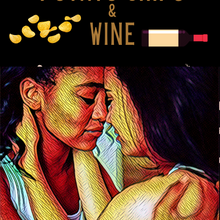How a toddler can enjoy kale: Vegan Cheesy Kale chips!
- Breeze Harper
- Nov 13, 2011
- 3 min read
Who says a 2.5 year old can’t like healthy food? I made these kale chips. He loves anything that is a ‘chip’, so this is why he seems to like kale chips. 🙂 They are lathered in apple cider vinegar, tahini, sesame seeds, a little agave, lemon juice, sea salt, and red pepper. I just throw it all in the blender, minus the kale. I lathered the batter on the kale last night and put it in the dehydrator. So, Sun woke up to ‘brunch’ with apple slices and kale chips (You need to check out the nutritional powerhouse that is kale, if you haven’t already).
Recipe is from this site: http://www.loveveggiesandyoga.com/2010/04/raw-vegan-kale-chips-making-our-own.html#comment-72161 I just altered it by using tahini instead of cashews and added apple cider vinegar.
Averie’s Raw Vegan Kale Chips Recipe for 1 Bunch of Kale 1 c tahini or raw sesame seeds (soaked for a few hours) 1 Medium Red Pepper 3 tbsp apple cider vinegar
Juice of half a lemon (2 Tbsp) 1/4 c Nooch (Nutritional Yeast) or more if you’re a fan of nooch. I use 1/3c++ 1 Tsp Sea Salt (or to taste) Optional 1/2 Tsp Agave or 1/2 of a medjool date

Dr. A.Breeze Harper (Credit: Pax Ahimsa Gethen 2016)
Dr. A. Breeze Harper is a senior diversity and inclusion strategist for Critical Diversity Solutions, a seasoned speaker, and author of books and articles related to critical race feminism, intersectional anti-racism, and ethical consumption. As a writer, she is best known as the creator and editor of the groundbreaking anthology Sistah Vegan: Black Female Vegans Speak on Food, Identity, Health and Society (Lantern Books 2010). Dr. Harper has been invited to deliver many keynote addresses and lectures at universities and conferences throughout North America. In 2015, her lecture circuit focused on the analysis of food and whiteness in her book Scars and on “Gs Up Hoes Down:” Black Masculinity, Veganism, and Ethical Consumption (The Remix)which explored how key Black vegan men use hip-hop methods to create “race-conscious” and decolonizing approaches to vegan philosophies. In 2016, she collaborated with Oakland’s FoodFirst’s Executive Director Dr. Eric Holt-Gimenez to write the backgrounder Dismantling Racism in the Food System, which kicked off FoodFirst’s series on systemic racism within the food system.
Dr. Harper is the founder of the Sistah Vegan Project which has put on several ground-breaking conferences with emphasis on intersection of racialized consciousness, anti-racism, and ethical consumption (i.e., veganism, animal rights, Fair Trade). Last year she organized the highly successful conference The Vegan Praxis of Black Lives Matter which can be downloaded.
Dr. Harper’s most recently published book, Scars: A Black Lesbian Experience in Rural White New England (Sense Publishers 2014) interrogates how systems of oppression and power impact the life of the only Black teenager living in an all white and working class rural New England town. Her current 2016 lecture circuit focuses on excerpts from her latest book in progress, Recipes for Racial Tension Headaches: A Critical Race Feminist’s Journey Through ‘Post-Racial’ Ethical Foodscape which will be released in 2017, along with the second Sistah Vegan project anthology The Praxis of Justice in an Era of Black Lives Matter. In tandem with these book projects, she is well-known for her talks and workshops about “Uprooting White Fragility in the Ethical Foodscape” and “Intersectional Anti-Racism Activism.”
In the spring of 2016, Dr. Harper was nominated as the Vice Presidential candidate for the Humane Party— the only vegan political party in the USA with focus on human and non-human animals.


























ความคิดเห็น